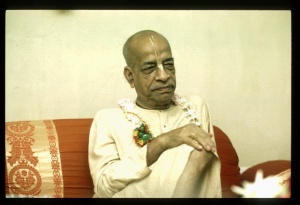SB 6.3.34: Difference between revisions
m (1 revision(s)) |
(Vanibot #0054 edit - transform synonyms into clickable links, which search similar occurrences) |
||
| (One intermediate revision by one other user not shown) | |||
| Line 1: | Line 1: | ||
{{info | {{info | ||
|speaker= | |speaker=Śukadeva Gosvāmī | ||
|listener=King | |listener=King Parīkṣit | ||
}} | }} | ||
[[Category:Srimad-Bhagavatam - Canto 06 Chapter 03]] | |||
[[Category:Bhagavatam Verses Spoken by Sukadeva Gosvami - Vanisource|060334]] | |||
<div style="float:left">'''[[Srimad-Bhagavatam]] - [[SB 6|Sixth Canto]] - [[SB 6.3: Yamaraja Instructs His Messengers|Chapter 3: Yamarāja Instructs His Messengers]]'''</div> | |||
<div style="float:right">[[File:Go-previous.png|link=SB 6.3.33]] '''[[SB 6.3.33]] - [[SB 6.3.35]]''' [[File:Go-next.png|link=SB 6.3.35]]</div> | |||
{{RandomImage}} | |||
==== TEXT 34 ==== | ==== TEXT 34 ==== | ||
<div | <div class="verse"> | ||
itthaṁ svabhartṛ-gaditaṁ bhagavan-mahitvaṁ | :itthaṁ svabhartṛ-gaditaṁ bhagavan-mahitvaṁ | ||
saṁsmṛtya vismita-dhiyo yama-kiṅkarās te | :saṁsmṛtya vismita-dhiyo yama-kiṅkarās te | ||
naivācyutāśraya-janaṁ pratiśaṅkamānā | :naivācyutāśraya-janaṁ pratiśaṅkamānā | ||
draṣṭuṁ ca bibhyati tataḥ prabhṛti sma rājan | :draṣṭuṁ ca bibhyati tataḥ prabhṛti sma rājan | ||
</div> | </div> | ||
| Line 16: | Line 22: | ||
==== SYNONYMS ==== | ==== SYNONYMS ==== | ||
<div | <div class="synonyms"> | ||
''[//vanipedia.org/wiki/Special:VaniSearch?s=ittham&tab=syno_o&ds=1 ittham]'' — of such power; ''[//vanipedia.org/wiki/Special:VaniSearch?s=sva&tab=syno_o&ds=1 sva]-[//vanipedia.org/wiki/Special:VaniSearch?s=bhartṛ&tab=syno_o&ds=1 bhartṛ]-[//vanipedia.org/wiki/Special:VaniSearch?s=gaditam&tab=syno_o&ds=1 gaditam]'' — explained by their master (Yamarāja); ''[//vanipedia.org/wiki/Special:VaniSearch?s=bhagavat&tab=syno_o&ds=1 bhagavat]-[//vanipedia.org/wiki/Special:VaniSearch?s=mahitvam&tab=syno_o&ds=1 mahitvam]'' — the extraordinary glory of the Supreme Personality of Godhead and His name, fame, form and attributes; ''[//vanipedia.org/wiki/Special:VaniSearch?s=saṁsmṛtya&tab=syno_o&ds=1 saṁsmṛtya]'' — remembering; ''[//vanipedia.org/wiki/Special:VaniSearch?s=vismita&tab=syno_o&ds=1 vismita]-[//vanipedia.org/wiki/Special:VaniSearch?s=dhiyaḥ&tab=syno_o&ds=1 dhiyaḥ]'' — whose minds were struck with wonder; ''[//vanipedia.org/wiki/Special:VaniSearch?s=yama&tab=syno_o&ds=1 yama]-[//vanipedia.org/wiki/Special:VaniSearch?s=kiṅkarāḥ&tab=syno_o&ds=1 kiṅkarāḥ]'' — all the servants of Yamarāja; ''[//vanipedia.org/wiki/Special:VaniSearch?s=te&tab=syno_o&ds=1 te]'' — they; ''[//vanipedia.org/wiki/Special:VaniSearch?s=na&tab=syno_o&ds=1 na]'' — not; ''[//vanipedia.org/wiki/Special:VaniSearch?s=eva&tab=syno_o&ds=1 eva]'' — indeed; ''[//vanipedia.org/wiki/Special:VaniSearch?s=acyuta&tab=syno_o&ds=1 acyuta]-[//vanipedia.org/wiki/Special:VaniSearch?s=āśraya&tab=syno_o&ds=1 āśraya]-[//vanipedia.org/wiki/Special:VaniSearch?s=janam&tab=syno_o&ds=1 janam]'' — a person sheltered by the lotus feet of Acyuta, Lord Kṛṣṇa; ''[//vanipedia.org/wiki/Special:VaniSearch?s=pratiśaṅkamānāḥ&tab=syno_o&ds=1 pratiśaṅkamānāḥ]'' — always fearing; ''[//vanipedia.org/wiki/Special:VaniSearch?s=draṣṭum&tab=syno_o&ds=1 draṣṭum]'' — to see; ''[//vanipedia.org/wiki/Special:VaniSearch?s=ca&tab=syno_o&ds=1 ca]'' — and; ''[//vanipedia.org/wiki/Special:VaniSearch?s=bibhyati&tab=syno_o&ds=1 bibhyati]'' — they are afraid; ''[//vanipedia.org/wiki/Special:VaniSearch?s=tataḥ&tab=syno_o&ds=1 tataḥ] [//vanipedia.org/wiki/Special:VaniSearch?s=prabhṛti&tab=syno_o&ds=1 prabhṛti]'' — beginning from then; ''[//vanipedia.org/wiki/Special:VaniSearch?s=sma&tab=syno_o&ds=1 sma]'' — indeed; ''[//vanipedia.org/wiki/Special:VaniSearch?s=rājan&tab=syno_o&ds=1 rājan]'' — O King. | |||
</div> | </div> | ||
| Line 23: | Line 29: | ||
==== TRANSLATION ==== | ==== TRANSLATION ==== | ||
<div | <div class="translation"> | ||
After hearing from the mouth of their master about the extraordinary glories of the Lord and His name, fame and attributes, the Yamadūtas were struck with wonder. Since then, as soon as they see a devotee, they fear him and dare not look at him again. | After hearing from the mouth of their master about the extraordinary glories of the Lord and His name, fame and attributes, the Yamadūtas were struck with wonder. Since then, as soon as they see a devotee, they fear him and dare not look at him again. | ||
</div> | </div> | ||
| Line 30: | Line 36: | ||
==== PURPORT ==== | ==== PURPORT ==== | ||
<div | <div class="purport"> | ||
Since this incident, the Yamadūtas have given up the dangerous behavior of approaching devotees. For the Yamadūtas, a devotee is dangerous. | Since this incident, the Yamadūtas have given up the dangerous behavior of approaching devotees. For the Yamadūtas, a devotee is dangerous. | ||
</div> | </div> | ||
__NOTOC__ | |||
<div style="float:right; clear:both;">[[File:Go-previous.png|link=SB 6.3.33]] '''[[SB 6.3.33]] - [[SB 6.3.35]]''' [[File:Go-next.png|link=SB 6.3.35]]</div> | |||
__NOTOC__ | |||
__NOEDITSECTION__ | |||
Latest revision as of 22:39, 18 February 2024

A.C. Bhaktivedanta Swami Prabhupada
TEXT 34
- itthaṁ svabhartṛ-gaditaṁ bhagavan-mahitvaṁ
- saṁsmṛtya vismita-dhiyo yama-kiṅkarās te
- naivācyutāśraya-janaṁ pratiśaṅkamānā
- draṣṭuṁ ca bibhyati tataḥ prabhṛti sma rājan
SYNONYMS
ittham — of such power; sva-bhartṛ-gaditam — explained by their master (Yamarāja); bhagavat-mahitvam — the extraordinary glory of the Supreme Personality of Godhead and His name, fame, form and attributes; saṁsmṛtya — remembering; vismita-dhiyaḥ — whose minds were struck with wonder; yama-kiṅkarāḥ — all the servants of Yamarāja; te — they; na — not; eva — indeed; acyuta-āśraya-janam — a person sheltered by the lotus feet of Acyuta, Lord Kṛṣṇa; pratiśaṅkamānāḥ — always fearing; draṣṭum — to see; ca — and; bibhyati — they are afraid; tataḥ prabhṛti — beginning from then; sma — indeed; rājan — O King.
TRANSLATION
After hearing from the mouth of their master about the extraordinary glories of the Lord and His name, fame and attributes, the Yamadūtas were struck with wonder. Since then, as soon as they see a devotee, they fear him and dare not look at him again.
PURPORT
Since this incident, the Yamadūtas have given up the dangerous behavior of approaching devotees. For the Yamadūtas, a devotee is dangerous.